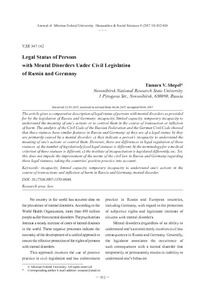Legal Status of Persons with Mental Disorders Under Civil Legislation of Russia and Germany
Скачать файл:
URI (для ссылок/цитирований):
https://elib.sfu-kras.ru/handle/2311/33305Автор:
Shepel, Tamara V.
Шепель, Т.В.
Дата:
2017-06Журнал:
Журнал Сибирского федерального университета. Гуманитарные науки. Journal of Siberian Federal University. Humanities & Social Sciences;2017 10 (6)Аннотация:
The article gives a comparative description of legal status of persons with mental disorders as provided for by the legislation of Russia and Germany: incapacity, limited capacity, temporary incapacity to understand the meaning of one’s actions or to control them in the course of transaction or infliction of harm. The analysis of the Civil Code of the Russian Federation and the German Civil Code showed that these statuses have similar features in Russia and Germany: a) they are of a legal status; b) they are primarily caused by a mental disorder; с) they indicate a person’s incapacity to understand the meaning of one’s actions or control them. However, there are differences in legal regulation of these statuses: a) the number of legislatively fixed legal statuses is different; b) the terminology for a medical criterion of these statuses is different; с) the institute of incapacitation is legislated differently, etc. Yet, this does not impede the improvement of the norms of the civil law in Russia and Germany regarding these legal statuses, taking the countries’ positive practice into account В статье дается сравнительная характеристика правовых состояний, обусловленных психи-
ческим расстройством, предусмотренных законодательством России и Германии: недееспо-
собности, ограниченной дееспособности, временной неспособности понимать значение своих действий или ими руководить в момент совершения сделки или причинения вреда. Анализ
Гражданского кодекса Российской Федерации и Германского гражданского уложения показал,
что данные состояния в России и Германии имеют общие черты: а) они являются правовыми
состояниями; б) обусловлены, прежде всего, психическим расстройством; в) свидетельству-
ют о неспособности лица понимать значение своих действий или ими руководить. Вместе
с тем существуют и различия в правовой регламентации данных состояний: а) неодинаково
количество легально закрепленных правовых состояний; б) используется различная термино-
логия для обозначения медицинского критерия этих состояний; в) по-разному закреплен ин-
ститут ограничения дееспособности и т.д. Однако это не препятствует совершенствованию
норм гражданского права России и Германии о названных правовых состояниях с учетом по-
ложительного опыта обеих стран

